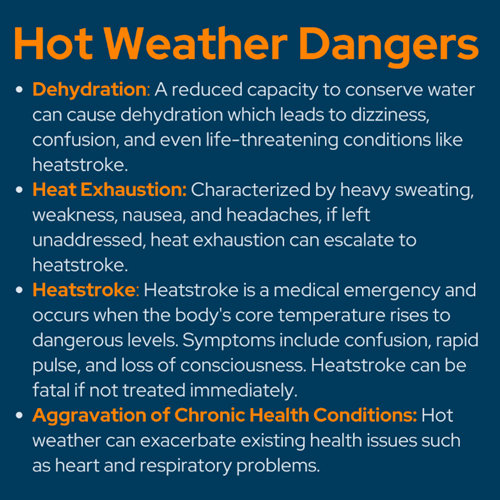Published: August 15, 2023
Special Tips for Seniors: Staying Safe in the Heat
This summer is setting record high temperatures. While the heat can be enjoyable for many, it can also pose serious risks, especially for senior citizens. These individuals are more vulnerable to the dangers of hot weather due to a decreased ability to regulate body temperature and adapt to extreme conditions.
Risk Factors Specifically for Seniors
Some heat-related risk factors are attributed to age-related physiological changes and other health conditions that are more prevalent in older adults. Some of the key risk factors include:
- Reduced ability to regulate body temperature: As we age, our bodies become less efficient at regulating body temperature, so we have a harder time cooling down when exposed to hot weather.
- Chronic health conditions: Pre-existing health conditions, such as heart disease, diabetes, and respiratory issues, can be aggravated by extreme heat. Medications for these conditions can also affect the body's ability to handle heat.
- Limited mobility: Some older adults may have limited mobility, which can hinder their ability to seek shelter or access cooling facilities during hot weather.
- Social isolation: Seniors who live alone or lack a strong support system may be more at risk during hot weather as they may not have someone to check on them regularly or offer assistance if needed.
- Medication use: Certain medications can interfere with the body's heat regulation, potentially increasing the risk of heat-related illnesses. Check with your doctor to avoid any issues.
- Dehydration: Seniors’ sense of thirst may diminish, leading to reduced fluid intake and an increased risk of dehydration during hot weather. Dr. Masooma Athar of Senior Health Primary Care explains, “Hydration among seniors does not only entail water intake; a diverse range of fluids (excluding alcohol and caffeinated beverages) help in avoiding dehydration.”
- Cognitive impairment: Seniors with cognitive impairments, such as dementia, may have difficulty recognizing and responding to heat-related problems.
- Environmental factors: Living in urban areas with limited green spaces or in homes without air conditioning can increase the risk for heat-related illnesses.

Warning Signs of Heat-Related Illnesses in Seniors
Due to these risk factors, it's essential for seniors, their caregivers, family members, and the community to be vigilant in monitoring the health of senior citizens during hot weather. Signs to watch out for include:
- Excessive thirst or dry mouth
- Fatigue and weakness
- Confusion and dizziness
- Flushed skin and rapid breathing
Suggestions to Head off Problems
Simple actions like regular check-ins, access to cooling centers, ensuring proper hydration, and creating awareness about heat-related risks can help protect older adults during periods of high temperatures. If you notice signs of heat-related issues, act promptly. Move the individual to a cooler place, offer water, and seek medical help immediately if symptoms worsen.
Are you looking for quality senior health care? The Elliot Senior Health Center is a full-service ambulatory healthcare center dedicated to helping seniors to achieve their maximum possible quality of life. One of only a handful of its kind, the Center offers a seamless network of senior healthcare services, including primary care, senior health psychiatry, outpatient rehabilitation, radiology, health education, and physical fitness programs, all under one roof.
